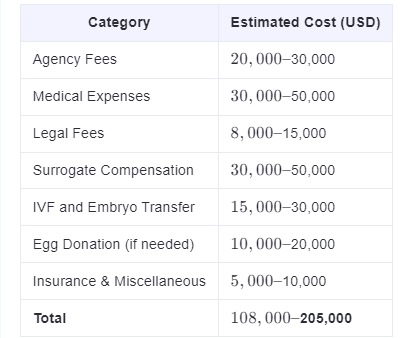Introduction
Surrogacy is an increasingly popular option for individuals and couples who are unable to conceive or carry a pregnancy to term. Whether due to medical conditions, same-sex relationships, or personal circumstances, surrogacy offers a path to parenthood that many find rewarding. However, one of the most frequently asked questions by those considering surrogacy is: “How much does it cost?” The answer varies widely depending on a number of factors, including location, legal requirements, and the type of surrogacy chosen. In this article, we’ll explore the average price for a surrogate, the components that contribute to the total cost, and what intended parents should consider when budgeting for this life-changing journey.
What Is Surrogacy?
Before diving into the costs, it's important to understand what surrogacy entails. Surrogacy is a method of assisted reproduction where a woman (the surrogate) agrees to carry and give birth to a baby for another person or couple (the intended parents). There are two main types of surrogacy:
- Traditional Surrogacy: The surrogate is genetically related to the child, as her own egg is fertilized with the intended father's sperm via artificial insemination.
- Gestational Surrogacy: The more common form, where the surrogate carries an embryo created using in vitro fertilization (IVF), with eggs and sperm from the intended parents or donors.
Gestational surrogacy is more widely accepted today due to fewer legal complications and emotional concerns.
Factors That Influence the Cost of Surrogacy
The total cost of surrogacy can vary significantly based on several factors:
- Geographic Location
- Type of Surrogacy
- Legal Fees
- Medical Expenses
- Agency Fees
- Compensation for the Surrogate
- Insurance and Additional Expenses
Let’s explore each in detail.
1. Geographic Location: Where You Choose Matters
One of the most significant factors affecting the price for a surrogate is the country or state where the surrogacy takes place. Legal frameworks and medical costs vary greatly around the world.
- United States: Surrogacy in the U.S. is one of the most expensive options, with total costs typically ranging from 100,000 to 200,000. This includes agency fees, legal costs, medical procedures, and compensation for the surrogate.
- Canada: While surrogacy is legal in Canada, commercial surrogacy is not allowed. Intended parents can only cover reasonable expenses, which may reduce overall costs.
- Ukraine and Georgia: These countries have become popular for international intended parents due to lower costs and favorable legal environments. The cost ranges from 40,000 to 60,000.
- India: Previously a top destination, India has tightened surrogacy laws, now only allowing it for Indian heterosexual couples. International surrogacy is no longer permitted.

2. Type of Surrogacy and Associated Costs
As mentioned earlier, gestational surrogacy is more common and generally more expensive than traditional surrogacy. Here’s why:
- IVF Costs: Gestational surrogacy requires in vitro fertilization, which includes egg retrieval, embryo creation, and embryo transfer. IVF can cost between 15,000 to 30,000 per cycle.
- Egg Donation: If the intended mother cannot provide eggs, a donor may be required. Egg donation can add 10,000 to 20,000 to the total cost.
- Legal Contracts: Since gestational surrogacy involves more legal complexities, contracts and parental rights establishment are more involved.
3. Legal Fees: A Critical Component
Legal fees can vary depending on the jurisdiction and whether the intended parents are local or international. In the U.S., legal fees for surrogacy can range from 5,000 to 15,000, depending on the complexity of the case.
Key legal considerations include:
- Drafting and reviewing surrogacy agreements
- Establishing parental rights
- Handling immigration or citizenship issues (for international parents)
- Court proceedings for birth certificate changes

4. Medical Expenses: The Largest Portion of the Budget
Medical costs are often the most significant portion of the surrogacy budget. These include:
- Prenatal Care and Delivery: Regular checkups, ultrasounds, lab tests, and delivery hospitalization.
- Complications: In case of medical issues such as gestational diabetes, preterm labor, or C-section, additional costs may arise.
- Medications: Hormonal treatments and fertility drugs for both the surrogate and the egg donor (if applicable).
On average, medical expenses can range from 30,000 to 50,000, depending on the number of IVF cycles and the presence of complications.
5. Surrogacy Agencies: Facilitating the Process
Many intended parents choose to work with surrogacy agencies that help match them with a suitable surrogate, coordinate medical appointments, and provide emotional support throughout the process.
Agency fees vary widely, typically ranging from 15,000 to 30,000. Some agencies offer all-inclusive packages, while others charge separately for matching services, legal support, and coordination.
6. Surrogate Compensation: Fair Payment for a Noble Service
Surrogates are compensated for their time, effort, and the physical demands of pregnancy. In the U.S., surrogate compensation typically ranges from 30,000 to 50,000, though this can be higher depending on experience or multiple pregnancies.
Additional compensation may be offered for:
- Pregnancy Complications
- C-Section Deliveries
- Multiple Embryo Transfers
- Twin or Multiple Pregnancies
It’s important to ensure that the compensation is fair and in line with industry standards to maintain ethical practices.

7. Insurance and Miscellaneous Expenses
Intended parents must also account for insurance and incidental expenses:
- Surrogate Health Insurance: Ensuring the surrogate has adequate coverage for prenatal care and delivery.
- Life Insurance for the Surrogate: Some agencies or legal agreements may require this.
- Travel and Accommodation: Especially if the surrogate lives in a different city or country.
- Psychological Counseling: For both the surrogate and intended parents.
These costs can add 5,000 to 10,000 to the overall budget
Budgeting for Surrogacy: Sample Cost Breakdown
To give you a clearer picture, here’s a sample breakdown of surrogacy costs in the U.S.:

Financing Surrogacy: Options and Considerations
Given the high costs involved, many intended parents explore financing options:
- Personal Savings
- Loans or Fertility Financing Programs
- Crowdfunding
- Employer Benefits (some companies offer fertility benefits)
- Insurance Coverage (limited to certain procedures in some regions)
It’s also worth exploring surrogacy in countries with lower costs if legal and logistical factors are manageable.

Conclusion: Planning for a Life-Changing Journey
Surrogacy is a deeply personal and often life-changing experience for intended parents. While the price for a surrogate can be substantial, understanding the components that contribute to the total cost allows for better planning and decision-making. Whether you choose to pursue surrogacy locally or internationally, working with reputable agencies, legal experts, and medical professionals is essential to ensure a smooth and ethical process.
By budgeting wisely and seeking support where needed, many families successfully navigate the surrogacy journey and welcome their long-awaited child into the world.
Frequently Asked Questions (FAQs)
Q1: Can I do surrogacy without an agency?
A: Yes, but it’s more complex. Working with an agency can streamline the process and reduce legal and logistical risks.
Q2: Is surrogacy legal everywhere?
A: No. Laws vary widely by country and even within states. Always consult with a legal expert familiar with surrogacy laws in your area.
Q3: Are there any tax deductions for surrogacy expenses?
A: In some countries, certain fertility-related expenses may be tax-deductible. Consult with a tax professional for guidance.
Q4: How long does the surrogacy process take?
A: From matching with a surrogate to the birth of the baby, the process typically takes 12 to 18 months, depending on IVF success and other factors.
If you're considering surrogacy and want to explore your options, start by researching reputable agencies, consulting with legal and medical professionals, and connecting with others who have gone through the process. With the right support, surrogacy can be a fulfilling path to parenthood.
